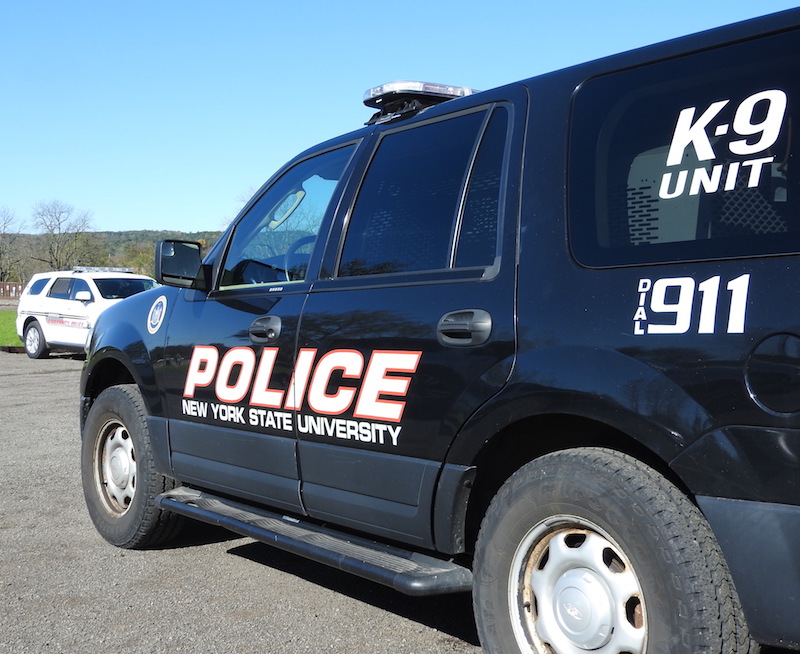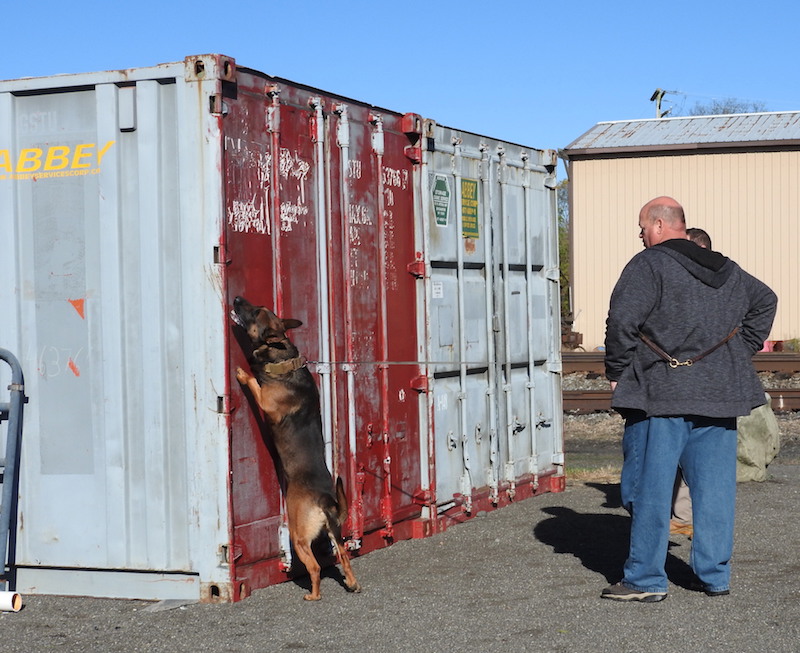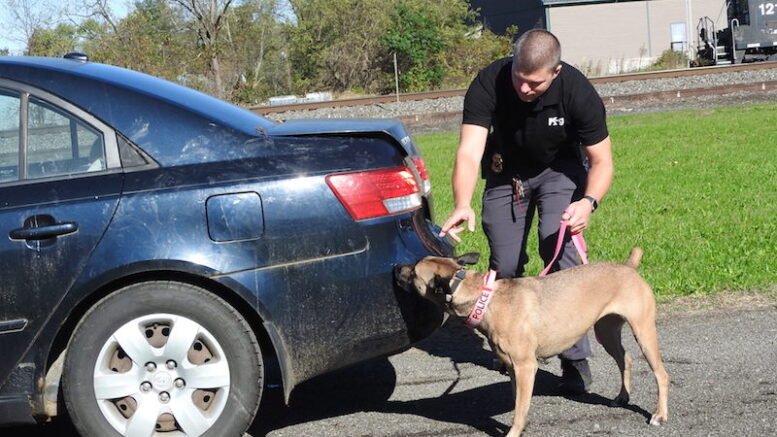On Tuesday, Oct. 19, several working dogs were able to participate in explosives detection as a part of their regular training. The session was conducted by the Southern Tier Canine Association, and hosted by the Owego Police Department at the Owego Fire Department Training Facility, located on McMaster Street in Owego.
According to Owego Police K-9 Officer Rick McCulskey, the dogs being trained arrived from SUNY Cortland, Cornell University, the Vestal, Binghamton and Owego Police Departments, and even SUNY Morrisville. The New York State Police also brought dogs that detect bombs, and the FBI arrived with explosives for the training.

Justin Haines, a Cornell University Police Officer, participates in explosives training on Tuesday in Owego with Luna, a 14-month-old German Shorthaired Pointer. (Photo by Wendy Post)
“If you have an explosive dog, they train twice a month to keep them updated,” said McCulskey, noting that they rotate training locations between Owego, Vestal, Cortland, and Scranton.
Justin Haines, a Cornell University Police Officer that arrived for training on Tuesday with his dog Luna, a shorthaired pointer, spoke briefly about his 14-month-old canine. According to Haines, he acquired Luna through the American Kennel Club’s Patriotic Puppy Program, and she now serves to detect explosives or suspicious packages, and also conducts demonstrations around the community and in the schools.
Outside of work, Luna lives the life of a family dog – going home each night with Haines and to his wife and two children, and where he can play with Haines’s retired working dog Chase, a yellow lab.

Trooper Jamie Gockel, who works out of the police barracks in Sidney, N.Y., conducts explosives training on Tuesday in Owego with Lock. (Photo by Wendy Post)
Jamie Gockel, a State Trooper out of the police Barracks in Sidney, N.Y., arrived with seven-year-old Lock for Tuesday’s training.
“He’s very helpful,” said Trooper Gockel, who acquired Lock when he was four and a half years old, and added, “He finds guns, ammo, and anything explosive.”
Trooper Gockel also noted that Lock is useful in searching for people, too, and cited a recent tracking by Lock that ended in the location of a suspect at large in Oneonta.
“They search for human odor,” the trooper explained.
Duane Shaffer, an explosives trainer from Miami, Fla., arrived in Owego to guide the training.
Shaffer was a one time dog handler and trainer for the Binghamton Police Department, and served in that capacity from 1984 to 2007. In 2009, Shaffer went to Afghanistan and trained dogs for about two years in explosives detection. These dogs,
From 2010 to 2011, Shaffer transferred to Boston, Mass. and conducted training for the Transportation Security Administration, or TSA, at Logan Airport. Following the Boston assignment, Shaffer transferred to Miami to train law enforcement and TSA canines.
On Tuesday, Shaffer talked about the working dogs, and their training.

K9 vehicles were parked near the Fire Department’s Training Facility in Owego on Tuesday for explosives training. (Photo by Wendy Post)
“[The dogs] have to be sociable and approachable, and have a good hunt and retrieve drive,” said Shaffer.
Prior to assignment out in the field of a canine, Shaffer explained that they need an eight-week indoctrination period, followed by 16 weeks of training with their handler.
“It is equally important to train both,” Shaffer added.
Shaffer also talked about the long history of canine use, and how today the German Shorthaired Pointers are the more popular breed, rising above the standard German Shepherd in popularity.

Pictured, Owego Police Department’s Larry Vanek supervises a search for explosives on Tuesday, and during a K9 training session held at the Owego Fire Department’s Training Facility on McMaster Street.
The German Shepherd, however, is still a common breed used in law enforcement and explosives detection.
Shaffer recalled Sam, an all-black German Shepherd that served the Binghamton Police Department for about three to four years in the 1980s. Sam started with narcotics tracking and was even able to track a rape suspect back to his home.
“He caught a lot of burglary suspects,” Shaffer explained.
In Afghanistan, and according to a report by Jon Micheal Connor from Army Public Affairs, military dogs, aside from an ultra-sensitive nose, must have traits of absolute obedience, discipline and loyalty. And, more smarts than can be imagined, along with the power to take down an adversary if necessary.
As an example, and in the Afghan capital, 200 dogs, that were just pups, were trained at a time at a Mine Detection Centre. The facility itself opened in 1989 and has trained more than 1,100 dogs, which are now a common site at checkpoints, government buildings and other high-security sites around Kabul.
In 2010, the North American Police Work Dog Association reported approximately 50,000 active police dogs in the United States. The most common breeds, according to the American Kennel Club that are trained as police dogs include Belgian Malinois, German Shepherd Dogs, Bloodhounds, Dutch Shepherds, and Labrador Retrievers. In 2021, over a decade later, that number remains the same.
As for the dogs of war, there are approximately 2,500 dogs in active service today, and 700 deployed overseas. And thanks to organizations like American Humane, a military initiative, service members are often able to reunite with their working dogs, and after they depart from the battlefield. Their website can be found at www.americanhumane.org/initiative/military-dog-team-reunifications/.
The Retired Police Canine Foundation is another animal welfare organization that also works to take care of the needs of retired police dogs. Their website can be found at www.policek9help.com.



Be the first to comment on "Explosives training for canines held in Owego"